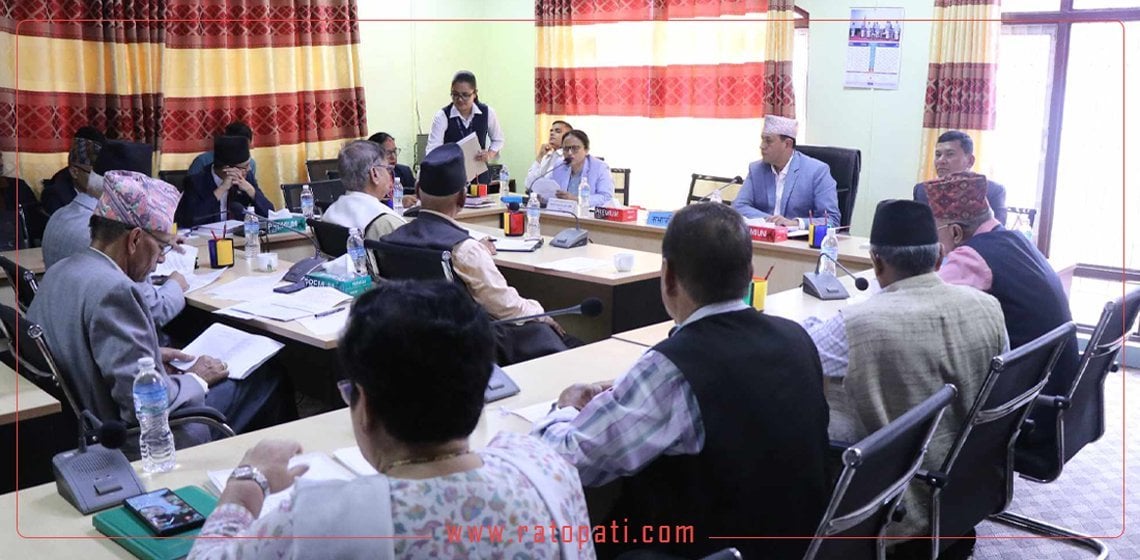Statute of limitation: MPs push for 10-year investigation window in graft cases
 File
File
Kathmandu, August 25 — The government is reconsidering its initial plan to impose a five-year limit on filing corruption cases. After widespread protests, there are now efforts to extend this limit to 10 years.
Members of Parliament have strongly opposed the five-year limit proposed in the Corruption Prevention Act (Amendment Bill) which is currently under review by the State Affairs and Good Governance Committee of the House of Representatives.
In response to this pressure, the major three parties are preparing to extend the limit, though it will still be constrained. The Commission for the Investigation of Abuse of Authority (CIAA) also supports extending the limit to 10 years, stating that it is appropriate for Parliament to decide on this matter.
CIAA Chief Commissioner Prem Rai suggested that the decision on the time limit is within Parliament's jurisdiction. During a meeting of the State Affairs Committee on August 23, he emphasized that Parliament has the authority to set laws for the Commission and that there is no strict requirement from the CIAA.
Rai mentioned that while investigations could be limited to five years, there is no restriction on addressing the loss of government property. He added that many experts have voiced opinions on this issue and that it is up to Parliament to make an informed decision.
Forty MPs have proposed amendments to the bill, arguing that a five-year limit would hinder investigations into major corruption cases and are calling for the removal of this limit. However, the Maoist Center, along with the CPN UML and Nepali Congress, supports a 10-year limit, according to a member of the State Affairs Committee.
Although the committee has not reached a final decision, there is ongoing discussion about implementing a flexible arrangement. Another parliamentary member believes that a consensus on the 10-year limit will be reached when the committee addresses this section of the bill. The CIAA has suggested that a 10-year limit would provide sufficient time for investigations and exert pressure on the authority to complete them.
A similar debate occurred in the Committee for Legislation Management of the National Assembly regarding the limitation in the Prevention of Corruption Act. At that time, a majority of MPs, including those from the CPN-UML, supported retaining the limit, arguing that it would not hinder investigations. As a result, the bill was passed with the limit in place.
Once the bill was submitted to the House of Representatives, discussions resumed over the scope of the bill. Some parliamentarians have proposed amendments to remove the limit on investigating corruption cases. Experts have also argued that there should be no time limit on corruption investigations.
The National Human Rights Commission has written to the State Affairs and Good Governance Committee, advising against imposing a time limit on corruption cases. The commission stated that the law should not be amended to grant immunity to corrupt individuals.
In its letter, the Commission emphasized that corruption is a serious crime, and imposing a time limit could increase the likelihood of perpetrators avoiding accountability and hinder efforts toward good governance and human rights. The Commission urged the Committee not to amend the law in a way that would allow exemptions based on time limits.
Committee head Ramhari Khatiwada mentioned that the committee has only recently begun discussions and has not yet reached a decision on the limit. He personally opposes the limit, believing that there should be no time restriction on corruption cases, and has maintained this stance in the committee.
"The Corruption Prevention Act (Amendment Bill) is still under discussion in the committee. We are taking the issue of limits seriously and engaging in thorough discussion," Khatiwada said. He added that while his personal opinion is against imposing a limit, he would respect the committee’s decision if a majority supports it.
Prime Minister KP Sharma Oli has indicated that it is up to parliamentarians to decide on the time limit for corruption cases. After a recent meeting of the House of Representatives, he clarified that the government would not make a decision on whether to impose a five-year limit. Instead, the decision will be made by parliamentarians through discussion.
Home Minister Ramesh Lekhak also stated that the limitation issue was included in the government's draft of the bill, but the final decision rests with parliamentarians. The government introduced the bill with a five-year limit, but it remains open to discussion as it moves through the parliamentary process. Lekhak emphasized that the committee's decision will be final once it is reached.
Khatiwada noted that the committee is expected to begin discussing the bill from Tuesday, starting with Section 2. He anticipated that it would take a few days to address the issue of limitations. Khatiwada expressed confidence that the committee would pass a well-considered bill, free from external pressure or influence. However, committee sources have indicated that informal discussions about limiting the bill are ongoing.










Leave Comment